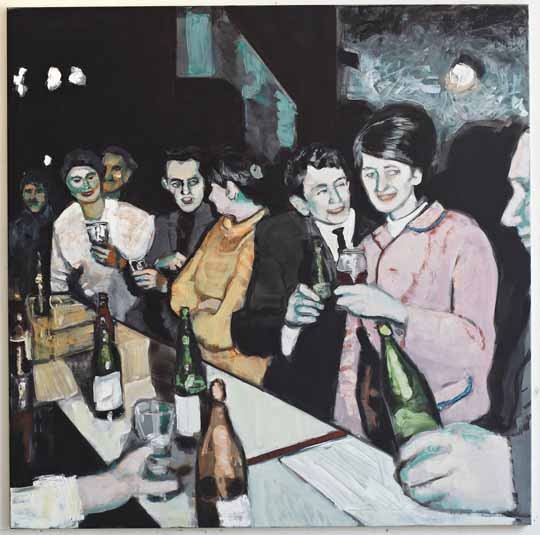Nemes Csaba
04 Apr - 09 Jun 2012
NEMES CSABA
Father's Name: Nemes Csaba
4 April - 9 June, 2012
Since 2009 Csaba Nemes is dealing in his paintings with photographies by his father of the same name in his series „Father’s Name: Nemes Csaba“. From the end of the 60ies until the mid 80ies his father took photos of different events of the families daily and leisure time life as well as their participation in diverse rural community activities. Reinterpreting this images into painting, Csaba Nemes processes biographical instants and concomitantly embeds those variable elements which constitute memory and society in general. Yet these elements appear in the photography at first as secondary information behind the autobiographical one. By means of choosing the photographic source-image, the events and the congruent pictorial transformation, he retraces both - a part of his own history and the context of a socialistic shaped society. A society that still is in a tenuous condition though profoundly upheavals within the last twenty years.
At first Csaba Nemes transformed the photographies in a quite direct manner, the paintings served quasi as preserver of fragile recordings and memory pieces, but with ongoing examination he changed his methodical approach: He removed or laid focus on details, changed colours or singled out specific details from an overall context. Furthermore his paintings refer to the actual political situation in Hungary by their sometimes ironical chosen titles and allow the viewer to perceive history as non-linear development of past and present experiences.
Besides his paintings, Csaba Nemes’ newest film „Stand here!“ (2010, 5min.) will be shown, a puppet animation which deals with a well known prejudice against Romanies - their liability to thievery. A white man and a young Roma encounter each other in a wood, whereat first one accuses the young Roma of stealing firewood without any evidence. The short, subtile dialogue reveals in a simple but very insistent manner accredited types and power structures that still can be experienced.
Father's Name: Nemes Csaba
4 April - 9 June, 2012
Since 2009 Csaba Nemes is dealing in his paintings with photographies by his father of the same name in his series „Father’s Name: Nemes Csaba“. From the end of the 60ies until the mid 80ies his father took photos of different events of the families daily and leisure time life as well as their participation in diverse rural community activities. Reinterpreting this images into painting, Csaba Nemes processes biographical instants and concomitantly embeds those variable elements which constitute memory and society in general. Yet these elements appear in the photography at first as secondary information behind the autobiographical one. By means of choosing the photographic source-image, the events and the congruent pictorial transformation, he retraces both - a part of his own history and the context of a socialistic shaped society. A society that still is in a tenuous condition though profoundly upheavals within the last twenty years.
At first Csaba Nemes transformed the photographies in a quite direct manner, the paintings served quasi as preserver of fragile recordings and memory pieces, but with ongoing examination he changed his methodical approach: He removed or laid focus on details, changed colours or singled out specific details from an overall context. Furthermore his paintings refer to the actual political situation in Hungary by their sometimes ironical chosen titles and allow the viewer to perceive history as non-linear development of past and present experiences.
Besides his paintings, Csaba Nemes’ newest film „Stand here!“ (2010, 5min.) will be shown, a puppet animation which deals with a well known prejudice against Romanies - their liability to thievery. A white man and a young Roma encounter each other in a wood, whereat first one accuses the young Roma of stealing firewood without any evidence. The short, subtile dialogue reveals in a simple but very insistent manner accredited types and power structures that still can be experienced.

